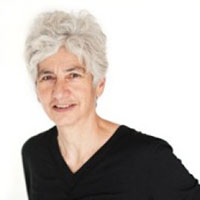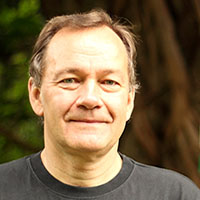By Christiane Rousseau & Jacek Banasiak
The “Global Change Impact on Diseases and Alien Species Expansion” workshop aimed to bring together young and senior researchers with diverse backgrounds, ranging from mathematical sciences--modeling or statistics--to biology, medicine, climate, forestry, environmental economy in order to create a common scientific foundation and to develop common interests and projects that will result in joint research.
The workshop took place at the African Institute for Mathematical Sciences (AIMS), in Muizenberg, South Africa othis past May. It was an international, interdisciplinary, educational and capacity building workshop with 40 participants coming from 15 different African countries, China, Cuba, and the Philippines, 13 lecturers, organizers and representatives of the partner organizations and 18 students of AIMS. To facilitate achieving this goal, the main focus of the workshop was education, training and networking. The workshop consisted of several mini-courses with laboratory sessions on the spreading and control of infectious diseases and invasive species, with a mixture of courses on mathematical modelling and on biological research of these phenomena, thus emphasizing the interdisciplinary nature of the field.
AIMS workshop participants discuss. Photo credit: AIMS
Owing to its nature, the workshop did not directly generate new research or publications, but, because of the contacts initiated, new projects and collaborations have already begun. In particular, some lab projects dealt with open problems and the teams who worked on these problems have continued their joint work after the workshop. Thanks to the combination of two major topics relevant to Africa; that is, infectious diseases and species invasion, both in the context of climate change, the workshop broadened and deepened research capacity in fields that are particularly relevant to Africa. Also, the format of the workshop with its emphasis on laboratory work with real data allowed for sharing the methods from diverse fields, especially as many students and young scientists for the first time worked on mathematically formulated problems relevant to their field of study, with real data, and are taking this experience back to their institutions and countries.
The impact of the workshop was enhanced by a public lecture by a world leading specialist on species invasion, Professor Mark Lewis from the University of Alberta, entitled How to Understand Territories with Mathematics. The lecture is freely available online at www.youtube. com/user/AIMSacza.
Over the course of the week participants were exposed to a number of techniques for mathematical modeling. In addition to learning these methods, various practical applications were illustrated. A round table at the conclusion involved all participants of the workshop. They reflected on their skill levels before and at the end of the workshop, and indicated possible problems they will be working on as a result of the workshop, and anticipated collaborations resulting from it. AIMS African Institute for Mathematical Science —Image used with permission.
The main aim of the workshop was education, training and networking. With this in mind, the main activities during the workshop were several mini courses that included labs and modelling with real data and even working on open problems. The participants were carefully selected from young researchers and postgraduate students from many countries and, in particular, from Africa. Also 17 South African students from AIMS and 5 South African students from other South African universities took part in the workshop. There were 21 female participants. The four ICIAM Fellows were: Richard M’Bra (Ivory Coast): winner of the prize for the best poster presentation Isabella Moraa Ondiba (Kenya): honourable mention for the poster presentation Raymond Katebaka (Uganda): started work with Abba Gumel Folaranmi Dapo Babalola (Nigeria): started work with Abba Gumel
AIMS workshop attendees at a session. Photo credit: AIMS
This was a unique event supported and sponsored by several international scientific unions under the umbrella of the International Council of Science (ICSU). Members from several unions were actively present at the workshop and gave lectures. These included Dr. Y. Degbuadze (IUBS), Dr. R. Glover (ICSU regional representative), Dr. Pablo Hernaez (ISB), Dr. C. Morin (NASA) and Professor Christiane Rousseau (IMU). We also had representatives from SA Centres of Excellence such as SACEMA (Prof. J. Hargrove), Centre for Invasive Biology (Prof. D. Richardson and his team), MaSS (Prof. J. Banasiak).
The round table discussion organized at the conclusion of the workshop showed an interest in sharing ideas and a decision to make submission to governmental agencies to ease access to data, the lack of which creates considerable delays and frustrations in conducting relevant research in Africa. The presence of so many diverse scientific unions ensures that the problems discussed at the workshop will reach decision-making bodies in many countries and will have an impact on their policies.
The main outcome of the workshop has been the formation of new international collaborations and prospective continuation of the work that has begun at the workshop. This will take place in part at conferences, workshops and research schools that have been planned for the next couple of years. A lasting legacy of the workshop is the videotaped mini-courses and lectures that are freely available on the web.
The workshop was supported by the International Council of Science (ICSU), a a joint venture between several international partners: International Mathematical Union (IMU), International Union of Biological Sciences (IUBS), International Union of Immunological Societies (IUIS), International Union of Microbiological Societies (IUMS), International Social Science Council (ISSC), International Council of Industrial and Applied Mathematics (ICIAM), International Council of Science Regional Office for Africa (ICSU ROA), International Society of Biometeorology (ISB), UNESCO, EcoHealth Alliance of Future Earth and Mathematics of Planet Earth: MPE.
 |
Christiane Rousseau is a professor at the University of Montreal. She has been on the executive committee of the International Mathematical Union of which she was vice-president from 2011–2014. As Director of the Centre de Recherches Mathématiques in 2013, she initiated “Mathematics of Planet Earth 2013,” which became a UNESCO International Year.
|
 |
Jacek Banasiak is the DST/NRF Chair in Mathematical Models and Methods in Biosciences and Bioengineering at the University of Pretoria. He has been vice president of the South African Mathematical Society and Chair of the South African Committee for the International Mathematical Union. |